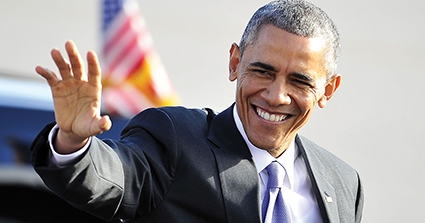Obama’s Foreign Policy
As President Obama’s time in office comes to a close, his supporters and critics are beginning to write his presidential history. The Atlantic writer Jeffrey Goldberg recently made a big step in that direction with “The Obama Doctrine,” a narrative essay that draws upon a number of personal interviews with the President. Goldberg provides an intimate, dispassionate account of Obama and his foreign policy.
Like his predecessors, the President is a complicated man whose views and values aren’t easy to separate from the everyday sausage-making of foreign policy. Is he a thick-skinned realist? A trigger-happy neoconservative? Or, as his lofty rhetoric suggests, is Obama an idealistic liberal? The Obama Doctrine goes a long way toward answering those questions.
No Time for Tradition
Readers will notice a president with little respect for tradition, whether that means traditional ways of thinking about foreign policy—what Obama derisively calls the “Washington playbook”—or the country’s traditional allies. In discussions with Goldberg, Obama refers to American partners in Europe and the Arab world as “free riders.”
He also blames Britain and France for the colossal failure of the 2011 NATO intervention in Libya: “When I go back and I ask myself what went wrong, there’s room for criticism, because I had more faith in the Europeans.”
Obama also has no regrets over his inaction in Syria, despite the fact that its five-year-long civil war has killed nearly half a million people, triggered a humanitarian and political crisis in the European Union, and strengthened Russia’s geopolitical position in the Mediterranean. “I’m very proud of this moment,” he tells Goldberg, referring to his 2013 decision not to authorize air strikes against Assad. Believing that Syria would be yet another entry in America’s long list of failed interventions abroad, he washed his hands of the situation. The human toll is regrettable, but nothing could be done.
All the King’s Straw Men
Despite Obama’s many strengths, I’ve been critical of his tendency to reduce the arguments of his opponents to straw men. This is a common thread in his interviews with Goldberg. In the President’s view, proponents of intervention in Syria offered no plan other than full-scale invasion and regime change (“invade the country and install a government you prefer”). This is patently false; the administration had a range of options short of putting boots on the ground, with the imposition of a no-fly zone being just one.
Obama’s defense of American inaction in Ukraine also looks like him flailing at a straw man: “We have to be very clear about what our core interests are and what we are willing to go to war for [italics mine].” As cabinet members John Kerry and Ashton Carter made clear, the administration could have supported Ukraine financially and militarily without going to war against Russia.
Obama justifies the lack of action in Ukraine in two ways: it’s not a major strategic interest to the United States, and Russia’s close proximity means Moscow will always have the upper hand: “Ukraine, which is a non-NATO country, is going to be vulnerable to military domination no matter what we do.”
The Obama Doctrine Laid Bare
So, what is Obama’s philosophy on foreign policy? He is a cautious man with a realist outlook (he often refers to “core interests” and “direct threats”), but he also has a liberal’s respect for multilateralism. The latter becomes obvious when he speaks about China. Unlike many people in Washington, Obama believes that a strong, prosperous China can be a reliable partner for the United States.
Perhaps by accident, he acknowledges that the US would benefit from being balanced by a strong rival power: “multilateralism regulates hubris.” This statement says it all. Obama is a realist who believes that international stability is achieved through balance. A United States that is unmoored in multilateral institutions and unbalanced by rival powers poses a danger to both itself and the international community.
Goldberg defines Obama’s strategy in simpler terms: “Double down in those parts of the world where success is plausible, and limit America’s exposure to the rest.” For a president with such sophisticated views on foreign policy, he has strikingly little interest in making it.
Joseph Larsen












